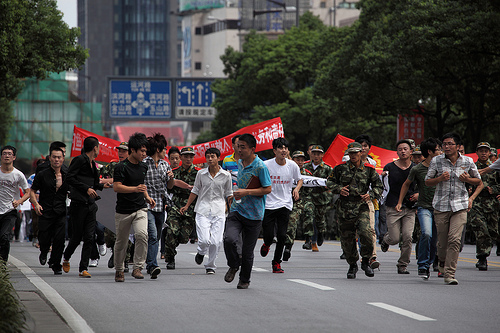China Silences Anti-Japanese Protest

After a weekend of increasingly aggressive anti-Japanese protests, Chinese officials worked Monday to temper the sentiment both online and on the streets.
The conflict, which centers on possession of a string of uninhabited islands (known as Senkaku in Japan, and as Diaoyu in China) in the East China Sea, has been creating tension between the neighboring countries for months. A breaking point came last week when the Japanese government announced plans to purchase some of the islands from their private owner.
The Chinese government immediately responded by sending marine patrol ships into Japanese waters around the islands, and Chinese citizens responded with an anti-Japanese campaign that has grown into a nationwide frenzy. This past weekend, demonstrations took place in over 60 cities, sometimes amassing a crowd of 10,000.
China’s authoritarian government usually restricts public protests and demonstrations of this caliber; however, the lack of government intervention reflected an official approval of the anti-Japanese sentiments and actions.
On Monday, Chinese Foreign Ministry Spokesman Hong Lei said, “The Chinese people have expressed their strong indignation. Whether the Japanese side can take seriously China’s firm stance and the Chinese people’s call for justice, and whether they can take the correct attitude and action will determine how the situation develops.”
While the Chinese government is unwilling to budge on their political stance against Japan, they realized their internal protests were posing a threat to Japanese citizens, and, if left unmonitored, a threat to turn on the government itself.
The demonstrations became destructive this weekend as Chinese protestors vandalized and/ or set fire to Japanese company properties. In the eastern city of Qingdao, a Panasonic factory and a Toyota dealership were lit on fire.
Many Japanese companies closed Monday due to the violence. The Chinese government announced plans to arrest those who continued to protest, and set up an online block against searches for anything related to the Japanese conflict.
In the western city of Xi’an, police have banned large scale protests in commercial areas, districts with large populations, and anywhere near government offices.
In the southern city of Guangzhou, where some of the largest protests were held, police have called out for the public to be “rational while being patriotic.”
Even Chinese media, which was previously calling for a national boycott and cancellation of all travels to Japan, is now warning against the aggression of the demonstrations. “Violent protests can never be condoned,” commented The Global Times online, “violence can only weaken the current campaign against Japan.”
More protests were expected Tuesday, which marks the anniversary of the Mukden Incident, a staged bombing in northeastern China by Japan in 1931 that the Japanese used as a pretext to invade Manchuria.
The Associaed Press contributed to this report










